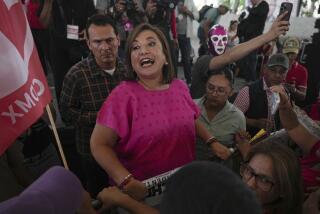Lugar Holds Up Decision on Philippine Observers
- Share via
WASHINGTON — Still beset with doubts about the fairness of presidential elections in the Philippines next month, Sen. Richard G. Lugar (R-Ind.), chairman of the Senate Foreign Relations Committee, withheld a decision today on sending congressional observers.
Lugar said a group of private professional election observers will visit the Philippines next week and report to the committee Jan. 23.
“Clearly those observers and the discussion of the committee on that date will be important in determining what if any role this committee or the Senate might play in observation of the Philippine election Feb. 7,” Lugar said at a news conference.
“It is too early to tell (about congressional observers).”
Philippines President Ferdinand E. Marcos, in power 20 years and accused of widespread corruption, is challenged by Corazon Aquino, whose husband, opposition leader Benigno S. Aquino Jr., was assassinated in 1984.
Lugar is wary of sending Senate observers to an election that advance surveys indicate may be rigged or its practices so restricted that the opposition will not have a realistic chance to win. The presence of Senate observers at an election Marcos won by fraud or force could be used by him to validate his return to power.
Lugar is also concerned that the military, controlled by Marcos, remain in the barracks during the election. Another group of observers reported last month that for a fair election to occur, the armed forces must not be “used for purposes of partisan influence . . . intimidation during the voting process, or ballot fraud.”
Marcos recently reinstated Gen. Fabian Ver, the military chief of staff who was acquitted of complicity in Aquino’s murder.
However, Lugar said, “I think the status of the military is completely one of conjecture,” and added, “This is a big factor.
The senator also said he is troubled by several other factors, including the fact that the opposition does not have equal access to the media; the failure of the government to fill two vacancies on the elections commission, and a lack of progress in developing a national computer system for a quick tally of the vote.
Lugar said he was encouraged that the Commission on Elections has accredited the National Citizens Movement for Free Elections to monitor the elections.
More to Read
Sign up for Essential California
The most important California stories and recommendations in your inbox every morning.
You may occasionally receive promotional content from the Los Angeles Times.












